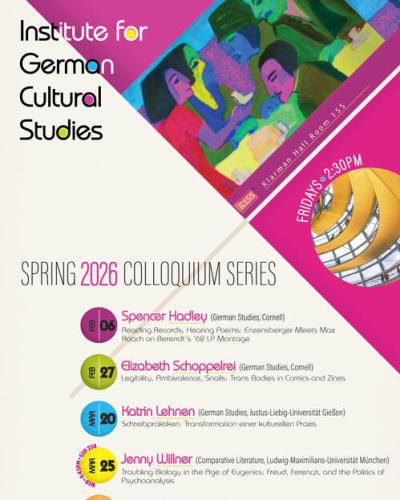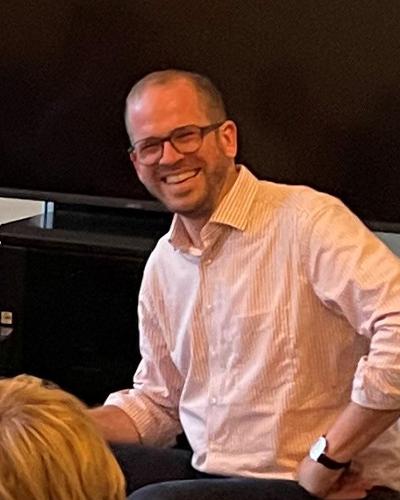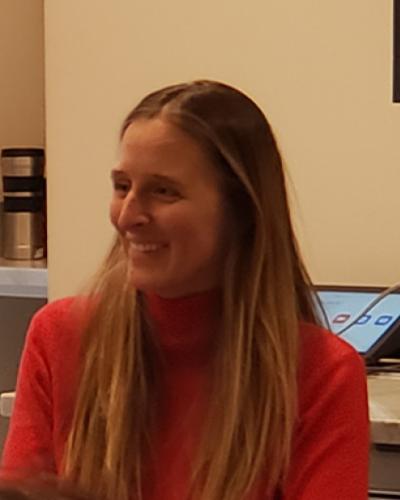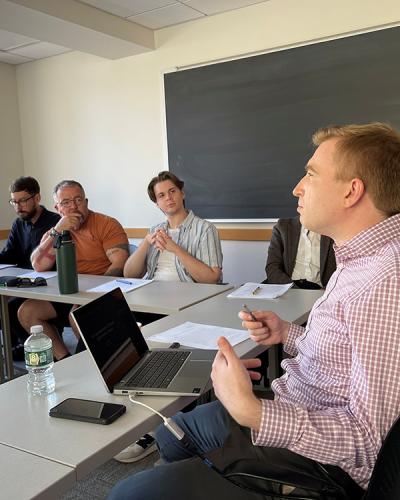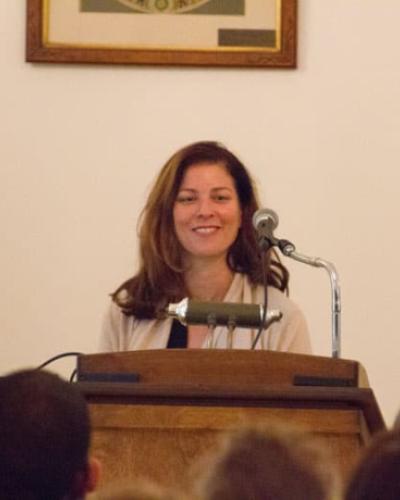Re-imagining the Discipline: German Studies, the Humanities, and the University
Day 1, Panel 1: “German Studies, the Humanities, and the University,” with B. Venkat Mani (University of Wisconsin-Madison) and Leslie Morris (University of Minnesota)
The conference’s first two presenters were concerned with “hyphenated cultures” in the changing social and cultural landscape of German-speaking countries and German Studies as a discipline.
B. Venkat Mani began his lecture, “German Studies, Hyperlinked!: The Rewarding Futurities of a Transnational Discipline,” with a comparison between Caspar David Friedrich’s well-known painting Der Wanderer über dem Nebelmeer and a recent poster from the Büchereiverband Österreichs “Grenzenlos lesen” campaign, which features a man standing atop a pile of books, looking out upon a sea of “welcomes” in different languages. In Mani’s reading, these images present us with two approaches to German Studies that are currently in tension: the first entails the study of the Wanderer’s literary counterparts, of a monolingual “Kulturnation,” while the second explores the possibilities of Austria and Germany as “Bindestrich-Nationen [hyphen-nations]” embracing cultural diversity and immigration. Mani also called attention to the student demographics of various German-Studies departments, arguing that the question is not only “which Germany” the field wishes to present but also who its students are, whether they have acquired the German language at home or are interested in it for other reasons. In closing, Mani proposed an understanding of German Studies as one link in a global network of “humanities hyperlinks,” a transnational body of knowledge informed by the many different cultures and languages present in German-speaking areas.
Leslie Morris’ lecture, "Unsettling German-Jewish Studies," elaborated upon one case of such a “hyphenated culture,” albeit not a recent one. Morris began with an invitation to probe the changing functions of German-Jewish Studies over time. She raised the possibility of a German-Jewish Studies that does not restrict itself to studying the “golden era” of the Weimar Republic or the persecution of Jews by the Nazis, highlighting the need to “ventilate the paradigms” of German-Jewish studies and proposing new forms of critical writing and experimentation with other media in order to complicate the basic presumptions of the field. In her view, German-Jewish Studies occupies a position of multilingualism and alterity, a position that breaks the standard connection between language and place. Such a transnational, post-monolingual approach de-emphasizes the linguistic aspect of the field while creating a productive research area beyond any pre-specified language or ethnicity. Morris proposed a transdisciplinary Jewish scholarship that moves beyond topics such as exile from majoritarian culture, the always-already Jewish, and the omnipresence of the Holocaust. (Tamar Gutfeld)
Day 1, Roundtable 1: “German Studies: Disciplinary and Interdisciplinary Snapshots,” with Vance Byrd (Grinnell College), Ervin Malakaj (University of British Columbia), Matthew Miller (Colgate University), Franziska Schweiger (Hamilton College), and Karina von Tippelskirch (Syracuse University)
A key topic for these presenters was the relative strength and structural advantage of German Studies departments despite the field’s diminishing size. Ervin Malakaj, for example, spoke on the benefits of a tightly knit program in which there is little division between language and context courses, where the curriculum is both integrated and flexible. He suggested that humanities departments at large research universities could learn from the success of such small-program models.
Franziska Schweiger highlighted the existential importance of collaboration with other departments and programs, arguing that outreach (whether to the study abroad office or the local community) will be a crucial factor in keeping shrinking departments afloat. Above all, she urged engagement at the local level, which entails, among other things, fostering awareness of local history and environmental issues.
Vance Byrd shared his department’s success after doing away with distribution requirements in favor of personalized academic “tracks” for each student. He argued the importance of community based learning and cohort-building, especially via faculty involvement in extracurricular events and activities.
Karina von Tippelskirch presented on possibilities for new curricular agendas in German Studies and the humanities, especially in response to the increasing disconnect between senior researchers and those just getting started in the field. She praised the Central New York Humanities Corridor—which involves Cornell University, Syracuse University, the University of Rochester, Le Moyne College, and the institutions of the New York Six Liberal Arts Consortium—as an example of successful cross-institutional coordination and cooperation.
Implied in this roundtable discussion, and explicitly addressed in the subsequent Q&A session, was the fact that, despite enormous financial and other institutional pressures, competition between humanities departments can in the long term only prove counterproductive. (Mark Mandych)
Keynote: “The Humanities of Testimony, Revisited,” by Sara Guyer (Director, Center for the Humanities, University of Wisconsin-Madison)
The keynote speech on Friday afternoon got underway with every seat occupied and chairs spilling into the hall. Those gathered had come to hear Dr. Sara Guyer’s keynote address entitled “The Humanities of Testimony, Revisited.” Drawing upon Geoffrey Hartman’s observation that within Holocaust studies “knowing what happened is a very different matter from actively receiving, let alone understanding it,” Dr. Guyer focused on the problematic role of testimony in today’s society. Using contemporary examples of fake news and conflicting evidence about climate change, she observed that the traditional role of testimony (as a tool for approaching vulnerability and violence) has resulted in the tricky negotiation between individual, often evidentiary, perspectives and fact-based evidence. Expanding on this and on Hartman’s observations around post-Holocaust epistemologies, Dr. Guyer framed the humanities’ current dilemma as a crisis of truth, wherein the tension between knowledge and experience has created a toxic, post-fact political culture. In addressing this issue, she used literary and historical examples to outline the difference between truth and truthfulness as two similar yet distinct phenomena. Where the former relies upon provable and repeatable facts, the latter relies upon testimony to contextualize those facts. In this regard, Dr. Guyer argued testimony is a tool for bridging the gaps between method, knowledge, and response, that it is a tool for shaping an imaginative capacity, and that it allows our knowledge of the past to be projected into a still unknown future that is yet to be shaped and molded. Dr. Guyer concluded that the humanities’ task is to implement the transformative power of testimony without ceding to either extreme of pure scientific reason or post-factual statements. There is an urgent need to narrate the difference between a hurricane coming for Alabama and a hurricane as a sign of climate change. In short, our task is to walk the line between knowledge and experience in order to project an inhabitable future for all. (Seth Thomas)
Day 1, Roundtable 2: “German Studies as a Multiple Discipline,” with Veronika Fuechtner (Dartmouth College), John Hamilton (Harvard University), Priscilla Layne (University of North Carolina, Chapel Hill), Elisabeth Strowick (New York University), and David Wellbery (University of Chicago)
Veronika Fuechtner started the discussion by focusing on the representation of minorities in German Studies, observing that the discipline was and still is mostly white. She proposed thinking about ways of collecting data on faculty diversity, and raised the possibility of introducing affirmative action for faculty hires. Priscilla Layne, who works in Black German Studies, moved in a similar direction by asking: Which voices are we excluding? She encouraged faculty to avoid Eurocentrism by paying attention to work by Afro-German scholars as well as theoretical works by writers such as Frantz Fanon. She also raised the question of how black German authors who primarily write in English are treated in the discipline.
Elisabeth Strowick stressed the importance of what the field of German Studies in the United States has already contributed with regard to modern German thought and stated that we must not let go of the theoretical contributions of the discipline. Hamilton argued that we do not need to reimagine German Studies very much. Rather, he argued, the humanities in general need reimagining because of their tendency to focus on the production of art in a way that ultimately results in monolingualism. He stated that foreign languages are marginalized in American High Schools and need to be promoted. David Wellbery concluded the roundtable by defining the discipline in three steps: first, he described a categorization of all individual disciplines. Second, he stated that any individual discipline is reflected in the other disciplines surrounding it. Third, he described the disciplines with the metaphor of an archipelago, constituted in shared interests, whose islands are in constant motion. (Dennis Wegner)
Day 2, Panel 1: “Challenges and Opportunities for Undergraduate and Graduate Programs,” with Helmut Müller-Sievers (University of Colorado, Boulder) and Lydia B. Tang (Assistant Director of Programs, Modern Language Association)
The second day of the conference started with a panel entitled “Challenges and Opportunities for Undergraduate and Graduate Programs.” Helmut Müller-Sievers (University of Colorado, Boulder) spoke first on the topic of “Diversifying the German PhD.” In his presentation, Müller-Sievers drew on his experience as the former director of the Center for the Humanities at UC Boulder to suggest that university administrators are not as hostile to the humanities as is sometimes believed. Rather, he argued, they are merely waiting for proposals for innovation from the humanities. He reminded the audience that administrators are also colleagues, and that it is crucially important for humanities faculty to take on administrative roles.
Müller-Sievers then provided an example of innovation in the humanities, namely the new Doctoral Consortium in Literatures and Languages at UC Boulder. This consortium is comprised of six PhD programs (Asian Languages and Civilization, German and Slavic, English, Spanish and Portuguese, Classics, French and Italian). The Consortium was introduced following an institutional review of these six programs. In order to provide better funding (including summer funding) to graduate students, a struggling program in Comparative Literature had to be closed and admission to the programs was limited. Crucially, the Consortium now enables these departments to defer recruitment for a year or more if they have not received any satisfactory applications. Müller-Sievers concluded that, although it was hard to communicate the planned changes to other faculty members, the various programs have already seen significant improvements since the founding of the Consortium.
Lydia B. Tang, Assistant Director of Programs for the MLA, delivered the second presentation of the panel, “Against Smallness: How Successful German Programs Reimagine the Humanities.” Tang stated that the smallness of German programs need not be an obstacle for positive developments in the discipline. She argued that what sets successful German programs apart is their capacity to see themselves in a broader humanities ecosystem. Like Müller-Sievers, Tang strongly supports the involvement of German Studies and other humanities faculty in administration. Regarding student demographics and the curriculum, she encouraged German programs to welcome students from diverse backgrounds and make it easier for undergraduates to double major in a language by reducing the number of required courses. Furthermore, Tang underscored that the university does not have a monopoly on language learning but rather should acknowledge the diverse linguistic landscape of North America. Four-year-colleges could also learn from conversations with community colleges and K-12 instructors, she concluded. (Dennis Wegner)
Day 2, Roundtable 3: “Taking Stock of Graduate and Undergraduate Programs and Curricula,” with Friederike Eigler (Georgetown University), Matt Erlin (Washington University, St. Louis), Jake Fraser (Reed College), Andreas Gailus (University of Michigan, Ann Arbor), Ulrich Plass (Wesleyan University), and Oliver Simons (Columbia University)
In the second conference session of Saturday, September 14th, roundtable discussants) approached a number of interlinked economic questions facing German Studies today. These include the questions of how German graduate programs can respond to the shrinking job market for tenure-track professors, how to provide students with both the language tools that allow the study of German literature and the skills that translate to employability following graduation, and how to balance the teaching of German (including literature and culture) as it is utilized in fields outside of the humanities (such as the STEM fields and the corporate world). The panelists also discussed the importance of balancing departmental strategies to meet varied student needs while still making sense from the point of view of funding and administrative bodies. These matters do not lend themselves to simple solutions, which both the panel and those in attendance readily acknowledged. The questions which followed the panel presentations took up these lines of inquiry in earnest, for instance by delving into the relationship between student demographics and course content in German-Studies curricula. (Jason Archbold)
Day 2, Panel 2: “Scholarship, Publishing Venues, and the Future of Higher Education: The Case of German Studies,” with Catriona MacLeod (University of Chicago) and Carl Niekerk (University of Illinois)
Catriona MacLeod, Professor of German Studies and Art History at the University of Chicago, opened this session with a talk entitled “Two-Way Streets: Disciplinary and Interdisciplinary Scholarship in German Studies,” introducing her work with two scholarly associations and emphasizing what these associations can do to foster interdisciplinarity in the field of German Studies. Her focus was on publishing and scholarship in German Studies as it currently stands after having diverged from the conservative, canon-focused Germanistik of the 1980s to become the more interdisciplinary field we experience today.
Additionally, MacLeod praised the openness of German-Studies departments in general, citing their strong connections with other fields and departments such as art history, visual studies, and philosophy, despite the fact that administrators may still have difficulty understanding a program in German Studies as interdisciplinary at all. Her key question was therefore how to position this interdisciplinarity more strongly, especially in intellectual terms. MacLeod argued that the role of scholarly associations and publications in promoting interdisciplinary work is not to be overlooked, especially for graduate students, who can initiate collaboration as well as funding opportunities via such projects. In addition to the Marbach Scholarship and Mellon Foundation grants, MacLeod also pointed to the various opportunities provided by the Goethe Association of North America and the International Association of Word and Image Studies, as well as open-access projects such as Clark Münzer and John Smith’s “Goethe-Lexicon of Philosophical Concepts.”
Carl Niekerk’s talk on “The Unconditional University, The Practices of German Studies, and the Future of the Humanities” was divided into two parts. First, he introduced the importance of photographic communication via the work of Belgian photographer Bieke Depoorter, who travels widely to find her subjects. As she makes clear in her 2017 work, As it may be, the key to creating such extraordinarily intimate photographs is to first establish a relationship with the people in her pictures. Thus, her work tells a two-fold story, one that is partly her own and partly that of her subjects. The most compelling aspect of her work, Niekerk argued, is the fact that the scenes aren’t staged, but rather are moments taken from everyday life.
In the second part of his talk, Niekerk discussed Jacques Derrida’s essay “The Future of the Profession or the Unconditional University,” emphasizing that when we speak about literature, we are speaking about a term that arose around 200 years ago in a specific Western context. Niekerk reminded the audience that Derrida situates Literature at the core of his concept of the unconditional university, which has surrendered its power to other domains and is therefore free.
Speaking as an editor in the digital age, Niekerk highlighted the importance of publishing to achieve certain academic career goals while also pointing out that the expectations of academic publishing have changed. He joined several other presenters at the conference in calling for more high-quality, open-access platforms and publications, especially for the sake of extending the reach of German Studies. (Anna Pfeifer)
Day 2, Roundtable 4: “Research, Publishing, Professionalization,” with Diane Brown (Cornell University), Sonja Fritzsche (Michigan State University), Carl Gelderloos (Binghamton University), Benjamin Robinson (Indiana University, Bloomington), Kizer Walker (Cornell University), Kirk Wetters (Yale University)
This final roundtable of the conference concerned research, publishing and professionalization in the humanities. The participants where asked to focus especially on the training of early career scholars.
Diane Brown, managing editor of the journal diacritics based at Cornell University, talked about reader reports, pointing out that in the humanities, the great majority of tenured professors stop submitting to peer review, which destabilizes the anonymous review process and forecloses any clear sense of audience. Brown shared her thoughts on what good reader reports can look like: A reviewer might focus on argument, stakes and originality, namely on what is present in the article, rather than on what is missing. Above all, she stressed that the reviewer is not supposed to “fix” the article but rather to provide an assessment of its contribution to the field. She pointed out the importance of having more discussion about how to evaluate scholarship and not to assume that feedback is fair just because it is anonymous.
Sonja Fritzsche recommended that German-Studies programs include interdisciplinary work as a valid form of research when considering candidates for tenure. Furthermore, Fritzsche opened discussion on how a shift to online or open-access journals could benefit future forms of scholarship.
Carl Gelderloos spoke about why it is so difficult for Germanists to produce “more interesting writing,” that is, writing with broader appeal outside German Studies, and why Germanists are almost entirely absent in rigorous ongoing conversations in publications such as the LA Review and others. He also referred to many other disciplines that successfully distribute their scholarship through other media such as podcasts, making academic conversations available to a broader audience. The question uniting all of these panelists: what can German Studies Scholars do to reach a more diverse audience and participate more fully in the current cultural conversation?
Kizer Walker spoke on university presses and book sales, observing that many humanities book series are being cancelled. He emphasized that while library spending on academic journal subscriptions has increased by 400 percent since 1980, book purchasing has not seen a similarly positive trend. This indicates, among other things, that library acquisitions cannot prop up faltering monograph sales across the publishing industry.
Benjamin Robinson reiterated the importance of maintaining distinct language departments despite institutional pressures to consolidate, arguing that individual and trans-disciplinary institutional research projects both need space to flourish. There is, in other words, a responsibility to think strategically about individual departments’ unique contributions while remaining intellectually open to collaboration across numerous fields.
Kirk Wetters warned that despite the best efforts of German Studies scholars, theory is no longer a “lingua franca” in research publications, noting the increasing value placed on well-written critical studies without theoretical language. “In the 90s, people with theoretical training felt they could speak competently about everything,” he remarked. This is evidently no longer the case. These days, he observed, scholars spend less time researching and more time reading other people’s work. (Anna Pfeifer)

